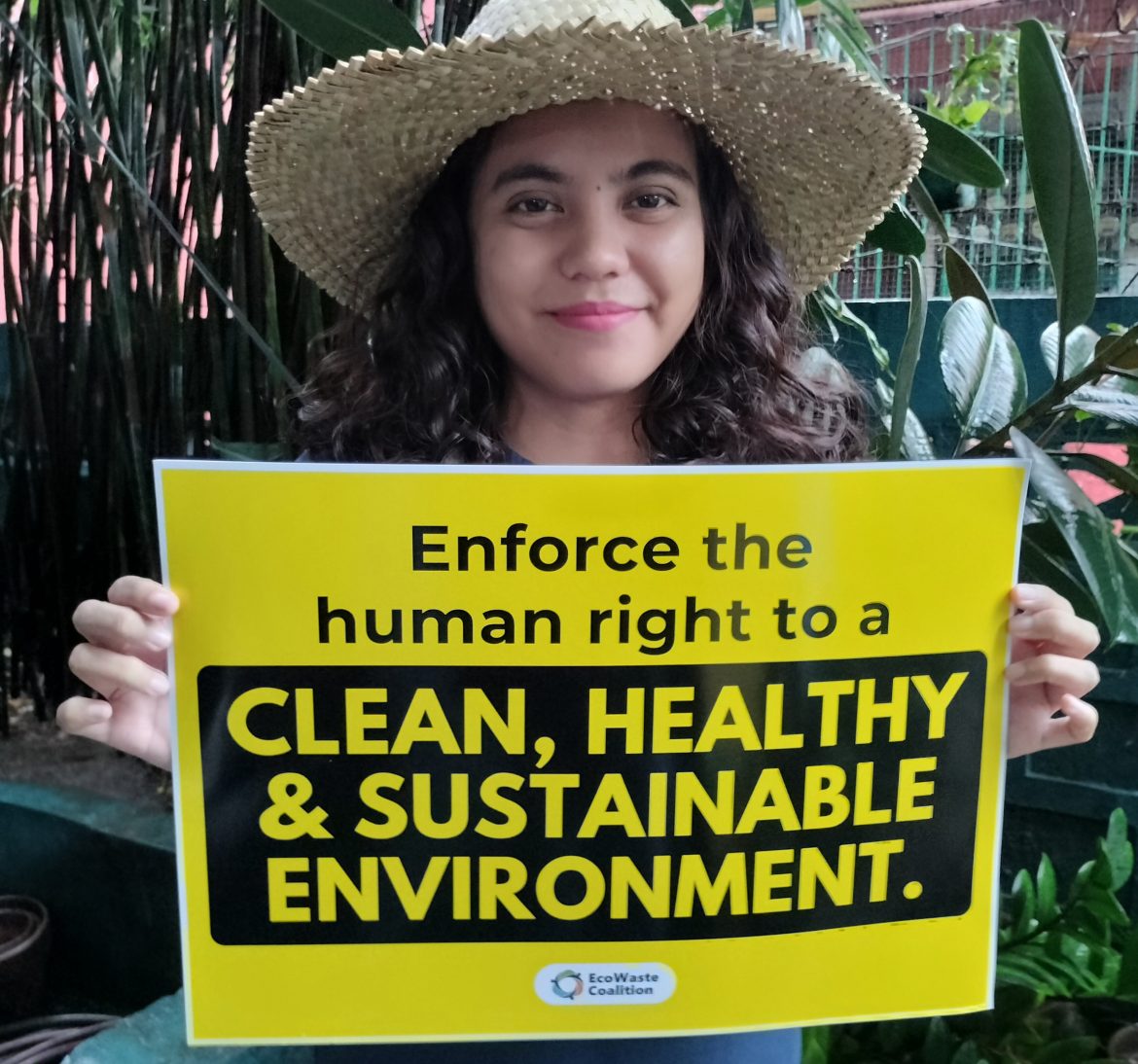QUEZON CITY — As affected families and communities rise from the onslaught of recent severe weather disturbances, civil society groups urged President Ferdinand Marcos, Jr. to prioritize policies, programs, and resources to effectively uphold the right of every Filipino to a clean, healthy, and sustainable environment.
For his fourth State of the Nation Address (SONA) on July 28, groups belonging to the EcoWaste Coalition, an advocate for a zero waste and toxics-free society, called on the chief executive to protect the human right of current and future generations from the combined threats of the triple planetary crisis of environmental pollution, climate change, and biodiversity loss.
The groups’ renewed call for action followed the release of a watershed advisory opinion by the International Court of Justice (ICJ) last July 23 affirming the right to a clean, healthy and sustainable environment as a fundamental human right, and if states fail to take “appropriate action to protect the climate system,” they could be liable for compensation and other forms of restitution.
“The monsoon rains, which have again caused hardship to millions in the Philippines, are further evidence that climate change needs action now. More than tariffs, trade, and politics, President Marcos must reassure the Filipino people of the government’s firm commitment to climate action and ensuring the fundamental right to a clean, healthy, and sustainable environment. The recent ICJ advisory opinion on climate change adds a further legal dimension to this – that States can be held responsible for failure to take effective climate action,” said Atty. Gregorio Rafael Bueta, Legal Counsel, EcoWaste Coalition.
“In light of the recent widespread flooding across the Philippines, the Interfacing Development Interventions for Sustainability (IDIS) urges the government to prioritize and invest in nature-based solutions. These include restoring wetlands, protecting forests, and rehabilitating rivers and watersheds,” said Atty. Mark Peñalver, executive director of IDIS and vice president of the EcoWaste Coalition. “Such sustainable interventions not only reduce flood risks and damage but also strengthen climate resilience, protect biodiversity, and secure clean water sources, ultimately empowering both communities and ecosystems to thrive together.”
“Greenpeace urges President Marcos to make climate action a top priority by demanding a swift and just phaseout of fossil fuels and holding climate polluters accountable for loss and damage,” said Jefferson Chua, climate campaigner, Greenpeace Southeast Asia – Philippines. “We believe he must use his platform to push for the passage of the Climate Accountability Bill (CLIMA), a crucial measure that would compel corporations to pay for the harm they’ve inflicted and help protect communities from the recurring cycle of climate-induced devastation and displacement.”
For his part, Rene Pineda, president of the Partnership for Clean Air (PCA), said: “The government should prioritize the mainstreaming of renewable energy over deadly and highly pollutive sources from coal and nuclear. It should enable more incentives for the development and operation of renewable energy sources as a way to mitigate emissions that exacerbate public health issues brought about by air pollution.”
“Action on Smoking and Health (ASH Philippines) urges the government to prioritize stronger laws that genuinely protect Filipinos from toxic and lethal products like tobacco and vapes with higher taxes, plain packaging, and broader advertising bans. Show government’s sincerity in upholding everyone’s right to a clean, healthy, and sustainable environment by curbing sources with a long list of air, water, and soil pollutants and preventing greenwashing tactics of the tobacco and vape industry,” said Dr. Maricar Limpin, executive director, ASH Philippines. “Health and environmental justice need to go hand in hand.”
While backing the enactment of CLIMA, the groups also pushed for the improved enforcement of existing pollution prevention legislations such as Republic Act Nos. 9003 (Ecological Solid Waste Management Act), 8749 (Clean Air Act), 9275 (Clean Water Act), 9729 (Climate Change Act), and other pertinent laws contributing to the protection of the human right to a clean, healthy, and sustainable environment.
“To uphold the rights of children, women and other vulnerable populations to health and to a healthy environment, we also seek the passage of the Safe and Non-Hazardous Children’s Products Act; the ratification of the Basel Convention Ban Amendment and the implementation of other amendments relating to plastic waste; and the nomination of lead chromates for listing under the Rotterdam Convention’s Prior Informed Consent (PIC) procedure to control the global trade of these chemicals used in the manufacture of lead-containing paints,” said Aileen Lucero, National Coordinator, EcoWaste Coalition. “We further seek the adoption of a strong global treaty to fight the plastic pollution crisis by putting a cap on plastic production, eliminating toxic plastic additives, and making polluters pay for the pervasive plastic pollution, among other essential provisions.”
The EcoWaste Coalition further urged PBBM’s Cabinet and lawmakers at both houses of the 20th Congress to prioritize other measures that will translate the Global Framework on Chemicals – For a Planet Free of Harm from Chemical and Waste, or the GFC, into national policies and plans of action.
While not legally binding like the Basel, Rotterdam, Stockholm, and Minamata Conventions, the GFC provides a framework for action towards a “planet free of harm from chemicals and waste for a safe, healthy and sustainable future.”
Among 28 targets, the GFC advocates for preventing the illegal trade and traffic of chemicals and waste by 2030, and the phase-out of highly hazardous pesticides in agriculture by 2035. It also calls for transitioning to safer alternatives and sustainable approaches in various sectors, including agriculture, industry, and healthcare, and in enhancing transparency of and access to information regarding chemicals in materials and products and their associated risks.
Green groups to PBBM: Uphold human right to a clean, healthy, and sustainable environment
1K


